Initiatives and groups vested in promoting the well-being of people with disabilities have been on the rise in Singapore—many focus on the school-going age group, with a smaller number catering to adults with disabilities. Besides raising awareness for a more inclusive society, such organisations often provide meaningful social engagement, skills training, employment opportunities and/or caregiver support for their membership and the larger community.
Mamre Oaks, a non-profit organisation and member organisation of Caritas Singapore, accepts members with intellectual disabilities, and who are aged 18 and above. With its mission to empower persons with intellectual disabilities to lead lives of meaning, dignity and fulfillment, Mamre Oaks seeks to create an environment where members are welcomed, respected and valued regardless of their disabilities and differences. HAN-PENG HO and TRANG LUU chat with board members Magdelene Yip, Geraldine Szeto and Diana Low at their premises in Agape Village along Lorong 8 Toa Payoh.
Tell us about your founding journey: what brought you together to start Mamre Oaks?
Magdalene: The seed was planted over a decade ago when Geraldine, Diana and I first joined Faith & Light, a Catholic-based community founded in France by Jean Vanier, who was also the founder of the first L’Arche residence for adults with intellectual disabilities. We met people whose children have intellectual disabilities, and these parents shared the challenges that their grown-up children specifically faced. Many adults with disabilities do not have friends, and although they all need and desire to be active and meaningfully engaged, most of them do not find such opportunities after leaving school. This is why we started Mamre Oaks—named after the Biblical site where Abraham provided hospitality to three angels who delivered miraculous news that his wife Sarah would be with child—to be a place where there is hospitality, nourishment and growth.
Mamre Oaks’ members are referred to as Special Persons (SPs). What sorts of programmes do you offer your SPs?
Diana: Other centres catering to people with disabilities are more work-focused, that is, they train their members for work and open employment, and organise workshops on how to choose jobs. Our work, in contrast, is more empathy- and activity-based, with a range of programmes in which employment-readiness is but one dimension. SPs’ attention spans can be quite short and they need a lot of encouragement, so just asking them to sit and do nothing but work is not feasible. Some of our member activities include music, cooking, dancing, baking, landscaping and yoga.
How do you manage to run this range of programmes with a relatively lean team?
Magdelene: We depend on divine providence! [Laughs] Actually, being housed in Agape Village is a big plus for us, because we can run a centre with all the necessary facilities situated under one roof. We have a baking room, a cooking room, a dance studio and multiple halls where we can organise our yoga classes. We also collaborate with other organisations in the Village and share our resources. For example, ABLE (Abilities Beyond Limitations and Expectations) has a van and can provide transportation for some of our members.
Besides the physical resources, we have the benefit of being part of Caritas and drawing from its volunteer management programme. Basically anyone who wants to volunteer can approach Caritas, which would then look to match volunteer interests and organisational needs. From this, we have a healthy pool of interested and committed volunteers directed to us, and we are able to maintain a good member-to- volunteer ratio. The commitment and consistency of the volunteers is good for our members—they are reassured to know that this person comes regularly to the centre at this or that time. We also have what we call specialist volunteers, who help conduct yoga or music classes, and are actively on the lookout for someone to start a line dance activity!
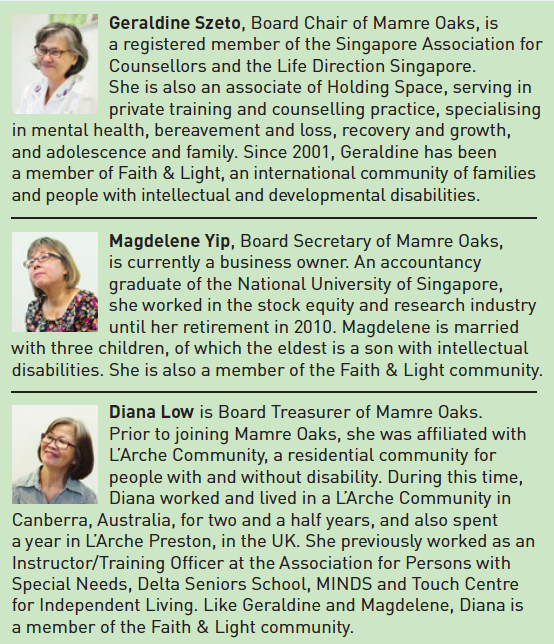
How do you choose the kinds of programmes to offer?
Geraldine: We mostly choose programmes that are fun and free!
Diana: They is also plenty of craftwork, like cross-stitching, with the assistance of volunteers or which SPs can take home to do.
Magdelene: We have yet to explore the feasibility of outdoor sports activities. One of the greatest challenges with our SPs is that they are sedentary, and don’t like to be out under the sun for long. Whenever I ask them to water the rooftop vegetable garden, they’d say, “It’s raining!” or give other excuses. However, going forward, we really want to find ways to encourage SPs to be more outdoorsy.
Any particular activity that has brought families together?
Geraldine: After a four-month art therapy programme, our art intern curated all the pieces and organised an art exhibition. That was really wonderful. We were very happy because the event got families of SPs interested in what they were doing. Our SPs themselves were also very excited about the exhibition—one of them went home and said to his family members, “This is happening, please come!” and he was so pleased when his mother, brothers and nieces came to show support.
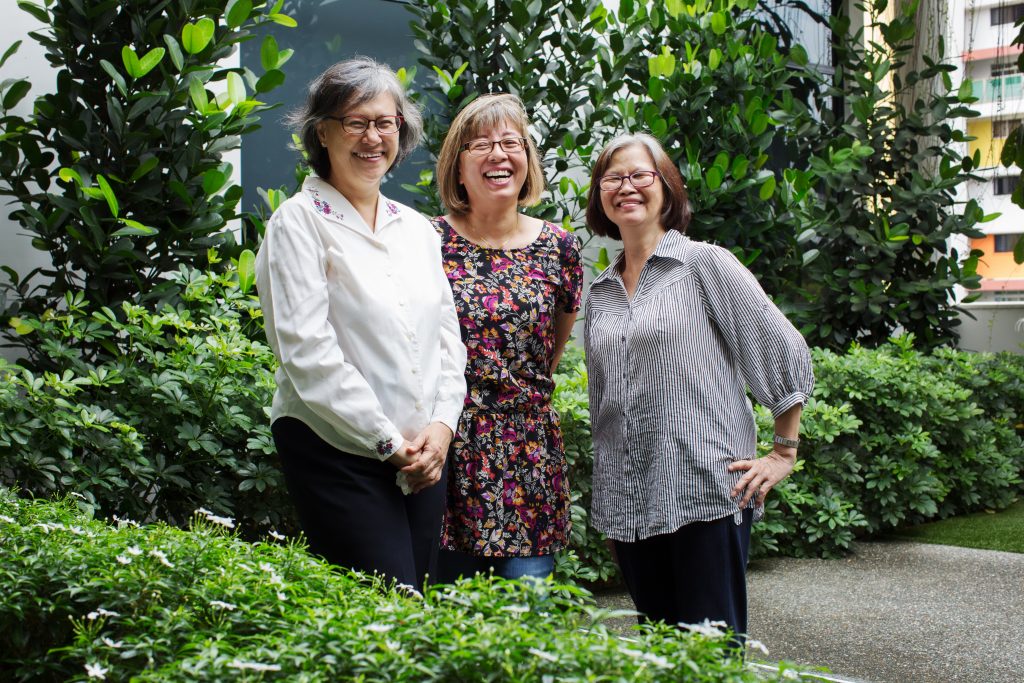 (L to R) Geraldine, Magdelene and Diana outside Mamre Oaks’ office, housed within Agape Village.
(L to R) Geraldine, Magdelene and Diana outside Mamre Oaks’ office, housed within Agape Village.
Could you share with us the profile of your members? What sorts of intellectual disabilities do they have?
Diana: We work with adults—mostly aged 18 and above—with cerebral palsy, Crohn’s disease, Down syndrome, Williams syndrome, Cornelia de Lange, dwarfism and autism, to name a few. Some of them can’t even draw or write their own names, so we need to hold their hands to help them to do so.
What are some ways in which Mamre Oaks’ SPs have benefitted from your programmes—do you have any stories to share?
Magdelene: We have, under our care, a girl who was initially able to function quite well and even graduated from special education school, but eventually regressed because her parents decided to keep her at home. When she first came to Mamre Oaks, she was always slumped in a foetal position and refused to look up to make eye contact with any of us. Every time we wanted to do something with her, we had to coax her and tilt our heads to look at her. However, after a year, she gradually felt more comfortable and was able to look us in the eye and respond. She even sang a song in our music session! Then, just two or three weeks ago, she suddenly stood up and walked to the toilet on her own. Everybody just stopped to exclaim, “She walks! She’s walking to the toilet on her own!” That got even the other SPs excited [laughs]! These were the milestones that truly marked her progress.
Geraldine: Because we are such a small group, whenever someone does anything different, everyone will rejoice.
In what ways has Mamre Oaks supported the families of its members?
iana: When the parents of our members first came here, many of them had to be around their children constantly in order to encourage them to engage in our activities. However, after a few months, they were able to leave them in our care, with peace of mind, and return to work.
Magdelene: This helps them out financially too—with their children placed at Mamre Oaks during the day, it frees the parents up to work and support the family. Additionally, they get some much needed respite and personal time for themselves.
Is it helpful that SPs spend some time of their days outside their homes and away from their families?
Magdelene: Yes. Over here, they can pick up essential independence skills and learn to take care of themselves. Their engagement in activities and social relationships can also keep them from regressing and developing depression, which commonly occurs as they age.
Do the SPs form close relationships with one another, as well as with your staff and volunteers?
Magdelene: Definitely. With them here every weekday, the SPs can easily form a community and get to know one another. Relationships are key to us here at Mamre Oaks, and we try to foster a nurturing community where SPs can create and maintain meaningful bonds with both fellow members and staff/volunteers.
Geraldine: We’re like family. Recently, some SPs started to call Joseph, our Centre Manager, “Godpa”.
Magdelene: We share the belief that everybody is unique. Like anybody else, people with disabilities crave relationships and love. In fact, with their intellectual disabilities, SPs have a greater capacity than most for love and friendship. In their openness, we see the beauty of the human spirit.
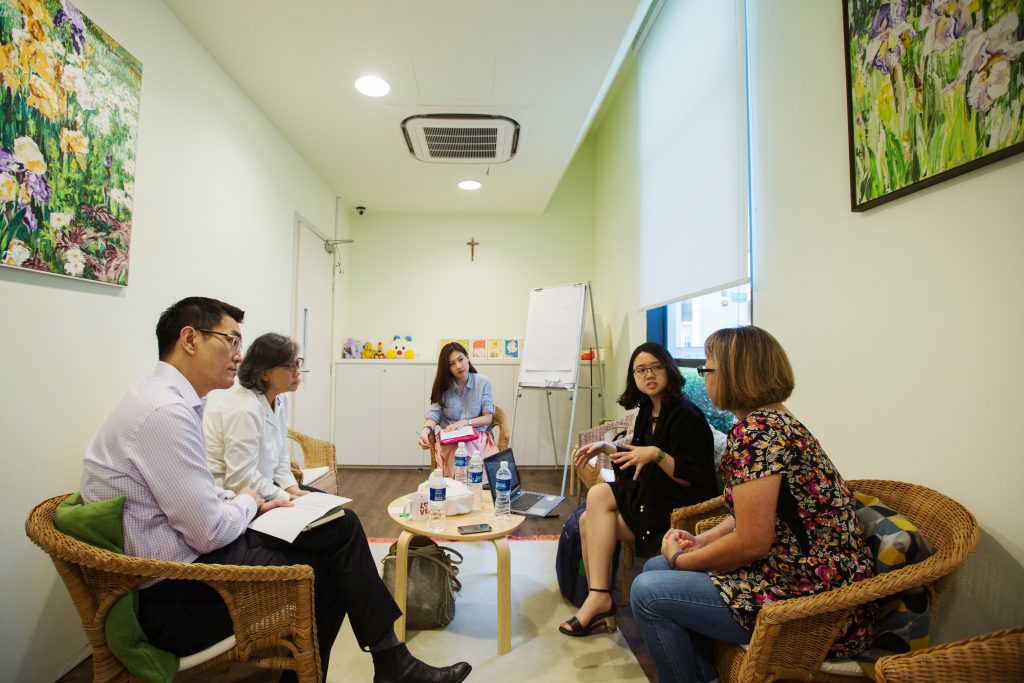 Han-Peng and Trang Luu in the midst of discussion with Geraldine, Magdelene and Diana; moderating the session is Eunice Rachel Low, Social Space’s Deputy Editor
Han-Peng and Trang Luu in the midst of discussion with Geraldine, Magdelene and Diana; moderating the session is Eunice Rachel Low, Social Space’s Deputy Editor
Let’s switch gears a bit and talk about inclusion, or inclusiveness. What is your vision of social inclusion, especially with regard to people with intellectual disabilities?
eraldine: To me, it is as simple as listening to what others have to say and respecting their opinions. Whenever we want to do something with our members, the first thing we do is ask for and listen to their thoughts. Our conversations with SPs are no different from those between you and me— instead of dismissing them simply as “intellectually disabled persons”, we place great importance in hearing what they are trying to say.
Magdelene: It’s important to give them a voice. I have a 27-year-old son, Sebastian, who has intellectual abilities. To me, it is crucial that Sebastian be included in as many activities as possible. Even though he is not a member of Mamre Oaks, I still bring him to a few inclusive activities which we run with special needs persons here. Generally, I want him and our members to do whatever a regular person can do, such as running marathons or going to concerts. In fact, Sebastian will join the Standard Chartered marathon in December!
Another key factor is more exposure to society. We encourage students wanting to obtain a Community Involvement Programme (CIP) certificate to participate in Mamre Oaks’ various activities and engage with our members. I believe that if young children are exposed to people with disabilities (whether physical or intellectual), they will be better able to understand and appreciate the potential of such individuals. And as these kids go on to become adults and employers, they would be more willing to offer jobs to persons with special needs.
Do you have a sense that society is becoming more accepting of people with special needs?
Magdelene: Singapore as a society still has some ways to go in that regard, but I have seen progress in recent years. These days, unlike even a decade ago, members of the public don’t recoil in fear when they see someone with a developmental disability, such as autism. Singaporeans today are less likely to shy away from those with special needs even though they seem “different”. On the bus or train, it is quite common to see SPs—some will be talking to themselves—but people around them are calm and cool about it. In the past, I would see mothers grabbing their children and running away because they were so scared [of SPs].
I think this sense of fear and confusion stemmed from a lack of understanding and exposure. But ever since more intellectually disabled people are becoming open about their conditions and we have more activities that include them, the public is better informed and more empathetic. A particular case comes to mind: a pregnant lady, who is quite advanced in her years, confided in me that she was afraid that she might give birth to a child with Down syndrome. However, after some time, she began to realise that even if her baby were to have a birth defect or a disability, it would still be fine, and she could accept that possibility. I don’t know what exactly helped her overcome her fears and accept future possibilities, but it gave me hope that there is less of a stigma attached to people with disabilities.
What advice would you give to employers, service staff and the general public to help them be in a better position to understand disabled people?
Magdelene: One of the areas that employers need to pay more attention to is better resources, both for themselves and for disabled people. They need to be empowered in order to be willing to employ people with special needs. I’m quite sure that many organisational leaders would like to help and provide work for the disabled, but many of these special needs persons are often unable to retain their jobs because they cannot cope with the workload or the pressure. Many bosses tend to find all of it too much of a hassle, and worry about disabled people lowering their businesses’ productivity levels—often, companies would rather donate a sum to charities supporting disabled individuals instead of actually hiring them. While big firms might have the infrastructure and resources in place to adopt inclusive practices, the smaller companies are the ones that are more hesitant to take the first step.
How has the experience of working with SPs helped you grow as an individual and a professional?
Geraldine: I think I’ve grown as a person in the sense that I just accept people for who they are. It doesn’t matter whether they are high-ability or low-ability, or whether they can talk and write well. My connections with SPs help me see people not for what they project onto the external world. After working closely with them, I can look deeply into people’s hearts and truly connect with them.
Magdelene: My journeys with both Sebastian (as a parent) and Mamre Oaks (as a professional) have given me a lot of hope. I no longer view having a child with special needs as a painful and bitter adversity, but as something which can bring me immeasurable hope and joy. I’m also beginning to see Sebastian through a different lens and appreciate his potential. It has been a life-changing experience for me.
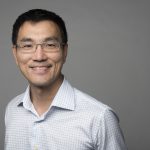 |
Han-Peng Ho is a Programme Manager at the Lien Centre for Social Innovation, where he works on research projects, partnerships and a variety of capacity-building initiatives. Current projects include a sociotech business plan competition; an executive training programme for C-suite leaders of non-profits and social enterprises; and a regional study examining the role of higher education institutions in the social entrepreneurship ecosystem. Han is interested in a broad spectrum of socioeconomic and cultural issues, some of which relate to social organisation and innovation, the development and transmission of various forms of capital, and the practice and outcomes of education. He can be reached at hpho@smu.edu.sg |
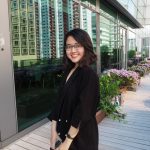 |
Originally from Vietnam, Trang Luu was a Summer Associate (Editorial) at the Lien Centre for Social Innovation. She is a junior at the University of Pennsylvania, where she majors in English with a concentration in Literary Theory and Cultural Studies. As a former research assistant at Write4Change— an educational project with a focus on socially conscious writing—she studied communication practices among adolescents in global writing communities. Trang’s summer stint at the Lien Centre married her interests in editing and publishing to her belief in the potential of the humanities as a catalyst for impact. She can be reached at trangluu@sas.upenn.edu |




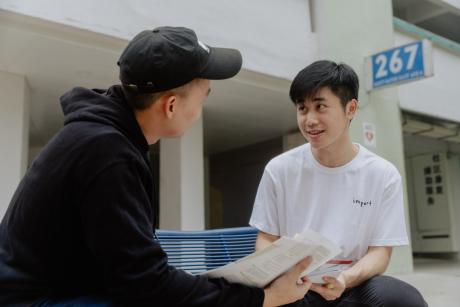



Comments